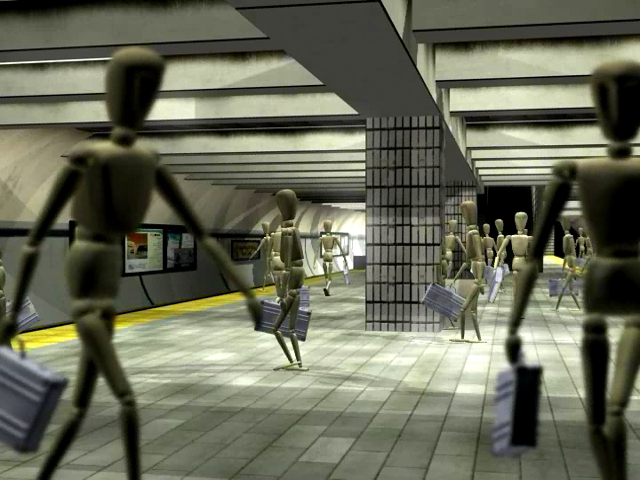The Crowd system in character studio lets you create realistic simulations using large groups of characters, humanoid and otherwise, that behave and interact with one another by procedural means. You can use it to easily animate scenes containing hundreds of people and/or creatures, all with similar or widely varying sets of behaviors. These can vary dynamically according to other factors in the scene.

Crowd of mannequins in a subway station animated using character studio
At the heart of the system are the Crowd and Delegate helper objects. A single Crowd object can control any number of delegates, which serve as stand-ins for crowd members. You can group delegates into teams, and assign behaviors such as Seek, Avoid, and Wander to individuals or teams. You can combine behaviors with weighting, so that, for example, a crowd member could seek a goal while wandering slightly.
Crowd simulations can range in sophistication from simple and straightforward to highly complex. Aiding at the latter end of the range is the Cognitive Controller feature, which lets you use the scripts to apply conditional transitions to sequences of behaviors. For example, you could tell a delegate to approach a goal until it gets within a certain distance, and then start moving away. Or you could use a Cognitive Controller to have a delegate move among a series of goals.
Another means of creating complex, dynamic crowd simulations is motion synthesis, which can be used in conjunction with the Cognitive Controller. The Crowd system offers two types of motion synthesis:
One of the most important requirements of crowd simulations is avoidance; if characters pass through each other or other objects in the scene, realism suffers. The Crowd system offers various behaviors to help achieve proper avoidance. It also provides the Vector Field, a special space warp, which, when applied to an irregularly shaped object, allows delegates to move around the object without penetrating it.
Used in combination, the Crowd-system tools described here can produce an endless variety of interesting, multi-character simulations. The Crowd topics in this manual provide detailed information about every aspect of crowd simulation.